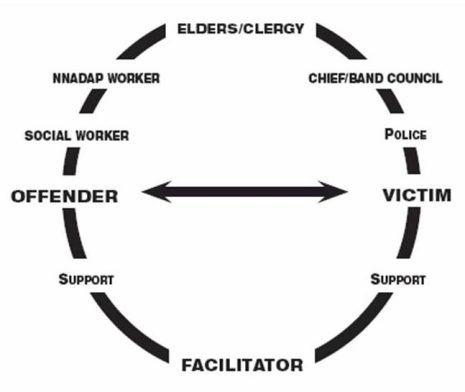Restorative Justice Pre-Charge
What Is Pre-Charge?
In our Pre-Charge Program we include cultural healing and traditional resources. A healing circle is done in this process, and provides an opportunity for the parties directly affected by the crime – victims, offenders and community members – to identify and address their needs to repair the harm caused by the crime.
Pre-Charge Restorative Justice means that diversion methods are used before criminal charges are laid. The process starts with a traditional circle, led by a Restorative Justice Facilitator. While attending the circle it is the goal to reach an agreement. Within this agreement, the offender agrees to take a course of action to repair harms caused by him/her to the victim. It is up to the offender to put in the effort and dedication needed to uphold the agreement. If the offender is successful in meeting the conditions set by the circle, then the matter is closed. If the conditions are not met the matter is referred back to the referring party for potential charges stemming from the offence(s) committed.
The following are some of the conditions of the Agreements made in a circle:
- Volunteering in the community
- Tending to Elders
- Apologies
- Restitution
- Written or verbal apology
- Attending presentations
- Attendance at school
- Testimonies, sharing of stories to provide a teaching
- Attending a treatment program/self-help program
It is important not to have strict policies on which cases can be referred to the pre-charge restorative justice program. Each case and all its circumstances should be thoroughly reviewed to determine eligibility. Restorative Justice practice is being used for Civil Matters, neighborhood disturbances, workplace disputes and harassment. In schools, restorative justice is being used for attendance, bullying, truancy and harassment. For criminal matters, restorative justice circles are most commonly used as a pre-charge diversion at the referring party’s discretion.
Examples of charges referred
- Theft
- Assault
- Break and Enter
- Breaches
- Bullying
- Mischief
- Trespass to Property
- Public Intoxication
- Impaired Driving
- Fail to Comply
- Disturbances
- Disputes
- Repetitive Warnings
This program gives all involved an opportunity to have a voice, to heal, and to grow within themselves and their communities. We want people to access further resources from this process as well as develop self-determination for positive decision making. Through motivation and understanding, Restorative Justice works towards changing the mindset of offenders to live more positively and recognize their strengths as individuals. We also aim to replace ineffective non-traditional and culturally unsuitable justice systems with more culturally appropriate community based healing methods.
For inquiries and referrals email: rjreferral@nanlegal.on.ca
Make a Referral:
Pre-Charge Referral From
WHO CAN REFER:
- Community Legal Workers
- Police Officers, Probation Officers
- Chief and Council
- Principals & Teachers
- Community Resource Workers
- Parents & Individuals
- Neighborhood Watch
What to Consider
- Has someone been harmed?
- Is there a need to repair the harm?
- Has the offender admitted responsibility?
- Could this cause further harm?
- Does the victim want this process?
Participation by all parties (victim, offender, etc.) must be voluntary.

Restorative Justice Circle "MAA-MII-CHI-KE-WIN"
Circle Participants
- Victim and their Supports
- Offender and their Supports
- Key persons involved in helping the offender and victim: Youth Workers, Social Workers, Teachers, Counselors, etc.
- Elders & Leadership